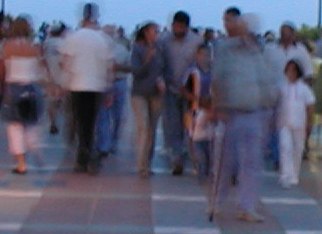(This page is part of my Anxiety pages)

It is not situations or events themselves that cause us anxiety or discomfort, it is the way we view, interpret or perceive them. It is our own thoughts that create stress or anxiety. In stressful situations, we tend to think negatively which in turn maintains or may increase the anxiety we feel. In dangerous situations this can be useful, e.g., 'I'm going to die' might be a thought that occurs as a bull chases us and we speed our way to the gate but this is clearly not a useful response if we are experiencing an anxious response in, say, a social situation. If we avoid a situation (i.e. 'take flight') this will produce a lessening of the physical symptoms as we move away from the perceived threat but it will not solve the problem, in fact it will tend to make it worse.
'Anxiety is interest paid on trouble before it's due.’
Dean William R. Inge
When we perceive we are threatened we tend to take flight from that situation. In the future we will tend to avoid the situation which caused us to be anxious. In fact, even just contemplating going back into that situation can cause us to feel anxious again. This anxious response to even thoughts of returning will reinforce our belief that this is a situation to be avoided at all costs. Moreover, we will tend to become anxious as we face or contemplate returning to not only the exact same situation, but also to all similar situations. This is called the generalisation tendency. Again, if the threat were real, this is useful, or adaptive, learning.
This is perhaps best explained by an example;
The Story of Ug
Ug is a prehistoric young man who lives in a cave. He was orphaned at an early age after his parents were killed by a large and ferocious sabre-toothed tiger one day whilst the family were out looking for food. Ug took flight and ran for his life but his Mum & Dad were not able to escape. Naturally, Ug's anxious response saved his life and nowadays he avoids sabre-toothed tigers whenever he can. In fact, even just the thought of being near one tends to give him palpitations and this learned behaviour has kept him out of trouble. Moreover, Ug finds that he is also anxious whenever he is faced with any animal which has large teeth and snarls a lot. This is because his anxiety has become generalised to include any and all animals which have similar characteristics. Thus, Ug now also avoids lions and bears as well. This piece of learning, i.e. that similar things could also be life threatening, has kept him out of trouble and has probably saved his life. We can consider his behaviour to be based on adaptive learning. Ug has learned to adapt his behaviour to the environment, in a way which is beneficial to him.
So far so good. But what about maladaptive learning, where our behavioural response is badly adapted to our environment? Again, the best way to illustrate this is by example;
Joe lives in a city and he is anxious. He has lost his job, he has money worries and has recently been in a car accident. All of this has increased his general anxiety. Joe goes to a football match to forget his problems. While he is there, his anxiety about his problems increases. Joe feels his heart thumping and his legs feel weak. Mistakenly, Joe attributes his anxiety to the crowd that he is in. He is mis-attributing his anxiety as being triggered by the crowd that he is in, rather than by his other problems. Consequently, Joe begins to associate the crowd with anxiety. Joe leaves the match early. On leaving the ground, his anxiety is reduced. In this way, Joe begins to confirm and strengthen his belief that crowds make him anxious. He feels anxious in crowds and the anxiety reduces when he leaves. It seems logical, but in fact, is illogical.

Joe thinks he is afraid of crowds and begins to avoid them ... but crowds are not the source of his fears and by avoiding them he creates further problems for himself.
Maladaptive learning
Next time there is a match on, Joe feels anxious as he is getting ready to go. He recalls that he was anxious on his last visit to the football ground. He decides not to go and the anxiety is reduced. Now Joe has further reinforced his learning that all crowds make him anxious. Furthermore, it seems to him that avoiding crowds reduces the anxiety. Joe therefore, begins to avoid other crowds. The learning has generalised from football crowds to any crowds.
If Joe was dealing with a sabre-toothed tiger this would be appropriate but what is specifically threatening or stressful about a crowd? Only what Joe perceives to be threatening.
Maladaptive learning is learning that is badly adapted to the environment in which you live. This is because in a normal life, there is little that can harm you from being in a crowd. Moreover, crowds are everywhere - in the train station, at the supermarket, in the high street - so if you start to avoid them it can have a significant negative impact on your life.
This is maladaptive learning. Joe lives in the city and there are crowds everywhere. As Joe has learned to be anxious in crowds, anxiety is often triggered. He therefore spends a lot of his time suddenly getting anxious, perhaps for no apparent reason, and then escaping from or avoiding the situation he is in when this happens. In the short term this feels like the right thing to do because it leads to a reduction in the anxiety Joe experiences. In the longer term it is harmful. The anxiety is becoming increasingly generalised and is occurring in response to more and more situations which, increasingly, have nothing to do with the source of the original anxiety. This will increase the number and intensity of the attacks. Joe thus becomes less and less well adapted to survive in his environment.
In days gone by we might have talked our feelings over in confidence with perhaps an older or trusted member of what might of course have been quite a large extended family. Or we may have sought counsel from a priest, imam, rabbi or other religious or spiritual leader. Many people are still fortunate to be able to do this, however, many of us do not have this facility, or would feel uncomfortable with it. In such circumstances, an alternative is to speak to a counsellor. Many people prefer this, valuing the confidentiality. Some people say that it is easier or preferable to speak to an 'impartial' third party.
In such cases the counsellor's role is to offer you a safe and non-judgmental space, to listen and to reflect with you on what they are hearing. They will listen out for and support you to be aware of, your feelings. They will support you to acknowledge all of your feelings, including any that you feel may be 'inconvenient' or which you perhaps do not wish to have or acknowledge. It is a gradual process that takes place at your pace. The emphasis isn't on 'problem solving' but on allowing you to 'take stock' of things.
If life adjustments are necessary, it is for you to come to this in your own way, in your own time. The counsellor won't get tired of listening because clients sometimes have to back over things many times in order to 'straighten things out' in their heads. Sometimes, nothing can be done about what has happened, or will happen, yet talking about things allows you to move towards acceptance, or to gently adjust your perspectives or expectations and therefore to live more comfortably with your situation.
Anxiety is the gap between the 'now' and the 'later.'
Fritz Perls, Gestalt-founding psychotherapist and author
Click Here to return to the Anxiety page or use the links at the top to navigate to a specific section.
Are you anxious? Take a free and confidential online anxiety test.
